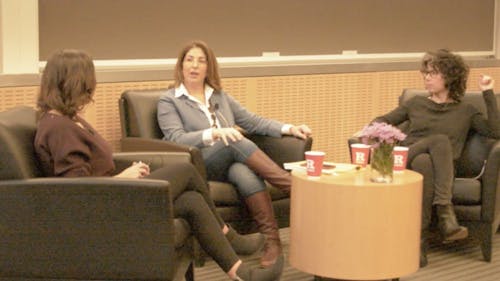Big tech companies dominate discussion in women's round table

Maybe it was the way David Fincher’s “The Social Network” framed the Facebook story, with a Sorkin screenplay to boot. The news reports of spas and balls pits at Google definitely went a long way to help. However it happened, as we stumbled out of the dot-com bubble into the age of social media, major new networks had shockingly little coverage on the alarming ways that giant tech companies could be used to subvert notions of privacy and democracy.
Now — in the aftermath of a presidential election marred by a combination of “fake news” and Cambridge Analytica-induced echo chambers — the highest-ranking officials of giant tech companies like Facebook, Google and Twitter have been subject to congressional hearings and increased scrutiny. Last night at the Rutgers Academic Building, a trio of women sat down to discuss the changing landscape concerning the Big Tech companies that know more about us than we ever expected.
Naomi Klein, the inaugural Gloria Steinem Endowed Chair in Media, Culture and Feminist Studies, hosted her first event at Rutgers entitled “Women Confront Big Tech.” She was joined by Meredith Whittaker, the co-founder of the AI Now Institute, as well as a research scientist at New York University (NYU) and Google. Rounding out the panel was Jacinta González, an organizer at Mijente, which is a national grassroots political hub for Latinx and Chicanx organizing.
The tone of the event was set early on when González joked about the supposed inherent goodness of technology. “Unicorns, free markets and technology are always the solutions to our problems,” she said.
González went on to explain Amazon’s role in Immigration and Customs Enforcement’s (ICE) crackdown on undocumented immigrants. Palantir Technologies, a data analytics company that has been contracted by the U.S. government in counter-terrorism efforts, has also been utilized for finding undocumented immigrants.
As ICE uses Palantir Technologies to surveille, their data is stored on Amazon Web Services, which is Amazon’s cloud service. Part of Mijente’s work is to try and pressure Amazon out of their deal with Palantir Technologies and the Department of Homeland Security (DHS). Technology that was first used in war zones has come home, and is being backed up by a company as omnipresent as Amazon.
Working in tandem with González’s activism, Whittaker has agitated for change from inside Google. Hearing about Google’s involvement in the development of drone technology, along with noting disparities in the workplace and executives getting golden parachutes after sexual assault accusations, led to her helping to organize the #GoogleWalkout.
The protest took place at Google locations around the world. Whittaker stressed a need for more insights from the world of grassroots organizing to be taken seriously at these huge corporations. She called tech-workers the “soft-handed” class and said that they had a lot to learn from longtime organizers.
Klein, who moderated the discussion, also made sure to mention the wide social and economic consequences of the Big Tech companies. “I think we were starting to have more discussion in media on the role that big companies like Facebook and Google were having on the media industry, because all the advertisement revenue was moving over to Google and Facebook. It has really created a crisis in journalism,” she said.
She also connected the dots between the “attention economy” and questions surrounding social media and mental health. From dealings with DHS, to workplace rights, to a sustainable and healthy media, the event covered the ways Big Tech seeps into our lives without us even noticing.
One thing that was repeated throughout the evening was how historical biases, both gendered and racial, are baked into the tech industry. The panel warned that without real vigilance and progressive movement within and outside of these companies, the technology they develop will only work to uphold traditional systems of power.
Francesca Petrucci, a School of Arts and Sciences senior, reflected on some of her takeaways from the event after it concluded. “I think the real point of this and the importance of it was the idea of coalition building, so being able to take (Whittaker's) work and (González's) work and kind of finding that synergy between them,” she said.
The women on the panel encouraged the audience to strive for change regarding Big Tech, whether inside or outside of the industry. Even after all the marketing these companies do to present themselves as unequivocal forces for good, Whittaker decided to paint Big Tech in a different light.
“This is what power looks like. They have bouncy balls and primary colors, but this is what power looks like. It’s like Standard Oil,” she said.



